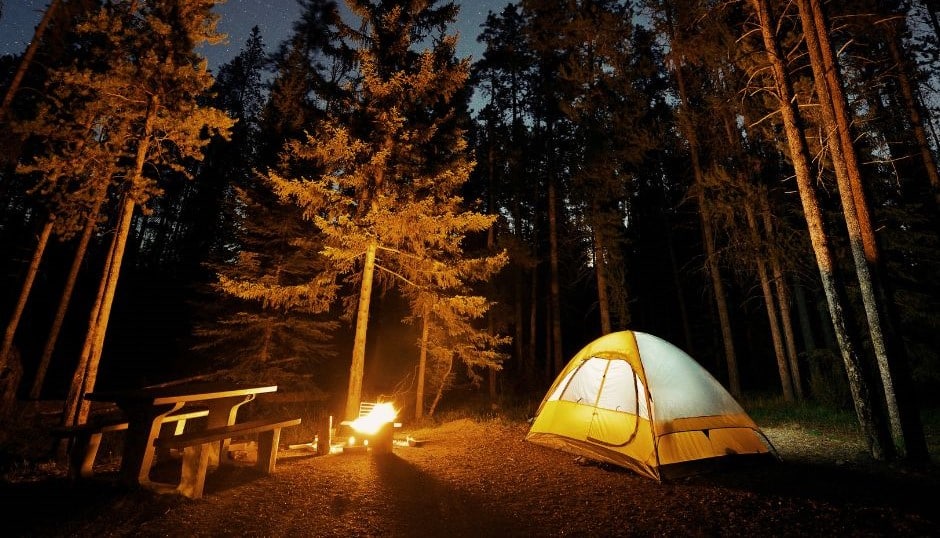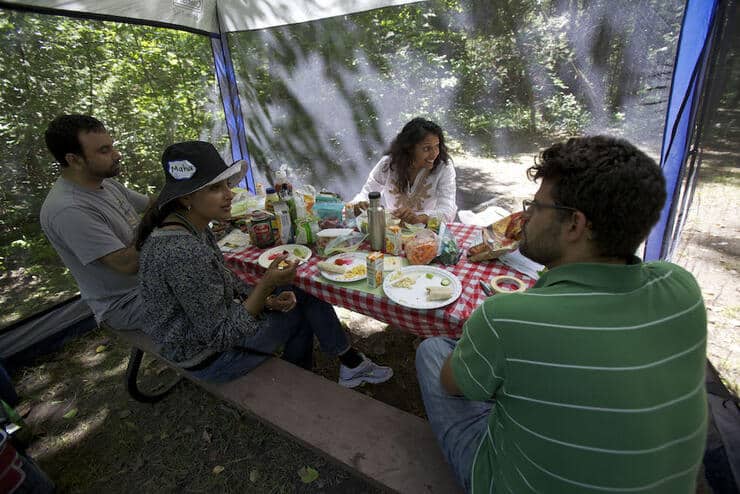
Camping For Beginners: Discover The Most Canadian of Summer Adventures
Want to experience the great Canadian wilderness but don’t know where to start? Read on for some recommendations to get you comfortable among the lakes, rocks and trees our region is famous for.
With incredible provincial / national parks and welcoming family-run private campgrounds located here, beginner campers have endless opportunities to connect with nature in this part of Ontario.
If you’ve never camped before, a good place to start is by booking a guided trip with one of the many outfitters in the region. Guided experiences introduce you to all the gear you’ll need if you every want to head out on your own, and with everything provided and arranged for you, this is more of a soft introduction to this popular Canadian past-time, with instructions plentiful and comfort considered. Here are just a few regional outfitters who offer guided canoe/camping trips.
Algonquin Bound Outfitters from overnight to five-day adventures
Algonquin Outfitters from an afternoon to more than a week to custom guided trips
Algonquin Park Adventure Tours guided canoe trips into the heart of Algonquin and wilderness camping.
Driftwood Paddle trips range from two night to two weeks. Run by brothers Chris and Kieran Kelly.
Northern Wilderness personal guide for weekend trips into the interior of Algonquin Park
The Portage Outpost day trips along the Oxtongue River
Voyageur Outfitting from private fishing trips to a seven-day backcountry canoe trip.
Ontario Parks also offers a Learn to Camp Park Ambassador Program at various locations across the province, including at Algonquin Park, Killbear, and Six Mile Lake. Here you’ll learn camping essentials, hands-on equipment use, and more.
Want to camp but don’t have transportation? Consider a trip with Parkbus.

Think you have a grasp of the basics? These outfitters can assist you with planning and gear to get you set up for a self-guided adventure:
Algonquin Park
Algonquin Outfitters Lake of Two Rivers Store – Canoe Lake – Oxtongue Lake – Opeongo Store & Water Taxi – Brent Store on Cedar Lake
Algonquin Park Adventure Tours
Algonquin Basecamp Adventure Outfitters & Supply
Northern Wilderness Outfitters
Opeongo Outfitters
Algonquin Bound Outfitters & Inn Dwight
The Portage Outpost
Almaguin Highlands
Algonquin Basecamp Kearney
Canoe Algonquin Kearney
Northern Wilderness Outfitters South River
Swift Outdoor Centre South River
Driftwood Paddle Algonquin Lake Kawawaymog Access Point
Voyageur Outfitting Algonquin Lake Kawawaymog Access Point
Muskoka
LIV Outside Bracebridge
Algonquin Outfitters Huntsville – Bracebridge – Port Carling
Swift Outdoor Centre Waubaushene
Parry Sound and Area
White Squall Outdoor Store Parry Sound – Nobel
Grundy Lake Supply Post Britt
Killbear Park Mall Nobel
Ontario Sea Kayak Centre Parry Sound
Parry Sound Bikes
South Algonquin
Opeongo Outfitters Whitney
Algonquin Bound Outfitters Madawaska

Choosing Your First Campsite
Provincial Parks:
- Offer well-maintained facilities and marked trails
- Require reservations through Ontario Parks up to five months in advance
- Perfect for drive-in comfort camping
- Drive in Provincial Parks in our region include: Algonquin, Arrowhead, Grundy Lake, Killbear, Mikisew, Oastler Lake, Restoule, Six Mile Lake, and Sturgeon Bay
Private Campgrounds:
- Often have more amenities (pools, playgrounds, organized activities)
- Can be less crowded than provincial parks during peak seasons
- May offer cabin rentals as a camping alternative
Here is just a partial list of private campgrounds in the region:
Almaguin Campground Katrine
Birch Bank Camp Restoule
Brennan’s Hill Camping and Cabins South River
Butterfly Lake Resort Port Carling
Camp Klahanie Magnetawan
Camping in Muskoka Gravenhurst
Clear Lake Eco Retreat Loring
Doe Lake Campground Rizzort Katrine
Four Corners Algonquin South Algonquin
Horseshoe Lake Camp & Cottages Parry Sound
King’s Portage Park Honey Harbour
Lake Bernard Park Sundridge
Lighthouse Cottages and Camping Sprucedale
Lillie Kup Trailer & Tent Campground Katrine
Parry Sound KOA
Picnic Island Resort Honey Harbour
Riverlake Campground McKellar
Santa’s Whispering Pines Bracebridge
White Birches Cottages & Camping Port Loring

Essential Gear for Camping from Ontario Parks
The Basics:
- Shelter: 3-season tent with rainfly and footprint
- Sleeping: Sleeping bag rated for seasonal temperatures (summer bags rated 0-10°C), sleeping pad or mattress
- Food and water: Cooler, cooking stove and fuel, plates, bowls and utensils, non breakable mugs, and water containers
- Clothing: Moisture-wicking layers, rain gear, sturdy footwear, extra socks
- Navigation: Maps, compass, or downloaded offline maps on your phone
- First Aid: Basic kit including bandages, antiseptic, pain relievers, and personal medications
- Camp chairs
- Lantern or headlamp
- Insect repellent (essential in Ontario!)
- Sunscreen
- Tarp for additional shelter

Safety in the Ontario Wilderness
Wildlife Safety
- Store food properly in your vehicle or designated food lockers. Bears are strong, racoons are clever and chipmunks are not as cute as they seem!
- Never keep food in your tent
- Make noise while hiking to avoid surprising wild animals
Weather Preparedness
Ontario’s weather can change rapidly, especially around the Great Lakes. Be prepared for:
- Summer thunderstorms (have a shelter plan)
- Wide temperature fluctuations between day and night
- Spring and fall frost (bring appropriate sleeping gear)
- Check weather forecasts before and during your trip using Environment Canada’s website
Emergency Preparedness
- Tell someone your itinerary and expected return date
- Bring a fully charged portable phone charger
- Know the location of the nearest hospital or emergency services
- Save the Ontario Parks emergency number: 1-877-847-7667

Camping Etiquette: Being a Good Neighbor
Respect for Others
- Observe quiet hours (typically 10 pm to 7 am)
- Keep your campsite clean and organized
- In Provincial Parks check out is 2pm
- Don’t have more people on your site than allowed
- Respect site boundaries
- Keep pets leashed and under control
- Your favourite music choice may not be your neighbour’s. It is better to have the sound of nature as your playlist. If you can’t live without music, use headphones or keep volume low
Environmental Stewardship
- Practice “Leave No Trace” principles:
- Pack out all trash (including food scraps)
- Stay on designated trails
- Use biodegradable soap for dishes (at least 200 feet from water sources)
- Use only designated fire pits
- Never feed wildlife or leave food unattended
- Use designated bathroom facilities

Campfire Guidelines
- Check fire bans before your trip on the Ontario Fire Info website
- Do not transport firewood around the province but buy locally to stop the spread of disease and invasive insects
- Never leave fires unattended
- Keep fires small and contained within fire pits
- Fully extinguish fires before sleeping or leaving your site
- Store firewood off the ground to keep it dry
Seasonal Considerations
Spring Camping (May-June)
- Be prepared for mud and potentially cold nights
- Bring additional layers and rain gear
- Fishing season opens (license required)
Summer Camping (July-August)
- Peak season: Reserve well in advance
- Be prepared for heat, humidity and thunderstorms
- Bring plenty of insect repellent
- Swimming opportunities abound
Fall Camping (September-October)
- Spectacular fall colours
- Cooler temperatures require warmer sleeping bags
- Fewer crowds and insects
- Some facilities begin to close after Labour Day

Learn to Canoe: Ontario’s Signature Outdoor Experience
Beginner Canoe Courses
Camping and canoeing go hand in hand, and with our plethora of lakes and rivers there are excellent opportunities to learn canoeing, which will open up countless wilderness adventures:
Canoe Courses:
Algonquin Outfitters provides instruction in and around Algonquin Park
Algonquin Park Adventure Tours
Madawaska Kanu Centre specializes in flatwater and whitewater instruction
MHO Adventures
What You’ll Learn in a Basic Canoe Course
- Proper paddle techniques
- Entry and exit methods
- Steering principles
- Safety protocols and self-rescue
- Basic trip planning
The local camping scene offers something for everyone, from peaceful lakeside sites to rugged wilderness adventures. By starting with car camping at established campgrounds, learning essential outdoor skills like canoeing, and respecting both nature and fellow campers, beginners can safely enjoy all that the outdoors has to offer. Remember that every experienced camper was once a beginner – embrace the learning process, start small, and soon you’ll be planning more adventurous trips into our breathtaking backcountry.

